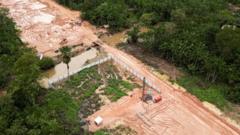A new four-lane highway is underway through vast areas of the Amazon rainforest, specifically constructed for the COP30 climate summit scheduled to take place in Belém, Brazil this November. While authorities emphasize the need for better traffic management as the summit is expected to attract over 50,000 attendees, including influential world leaders, the environmental ramifications cannot be ignored.
Conservationists and locals are alarmed as the highway, touted by the state government as "sustainable," threatens the integrity of a crucial ecosystem. The Amazon rainforest serves as a significant carbon sink and is critical to global biodiversity. Critics argue that deforestation for the road contradicts the summit's environmental goals, with massive swathes of the forest now cleared, leaving a stark landscape of cut logs and a disrupted ecosystem. The construction, which stretches over 8 miles into the protected area, raises fears of future deforestation as accessibility increases for businesses.
Local resident Claudio Verequete, who relied on harvesting açaí berries, expresses his devastation as he stands near the construction site. "Everything was destroyed," he laments, highlighting the lack of compensation and the uncertainty about future developments that may further jeopardize their community. He fears that businesses will encroach on their land, leading to more displacement for residents who are deeply rooted in the area.
The construction cuts through vital wildlife habitats, with experts warning that this fragmentation can severely disrupt animal migration patterns. Prof. Silvia Sardinha, a wildlife veterinarian, highlights the negative impact on rehabilitation efforts for injured wildlife, as less natural space hinders their return to the wild.
Government officials assert that this summit is a unique opportunity to center discussions on the needs of the Amazon and showcase governmental efforts for its protection. However, local voices remain unheard, as plans that were shelved due to environmental concerns are now rapidly being revived to accommodate the summit's logistics.
Despite the ongoing construction, some residents and businesses in Belém see potential opportunities for economic growth. Business owners voice hope that necessary infrastructure improvements will lead to an enhanced future for the city. “We hope the discussions aren't just on paper,” one market vendor states, emphasizing the urgent need for effective climate action that won’t further harm their environment.
As world leaders prepare for COP30, questions arise regarding the overall impact of shuttling thousands globally and the subsequent infrastructure needs that may like undermine the summit's core purpose of addressing climate change effectively.
Conservationists and locals are alarmed as the highway, touted by the state government as "sustainable," threatens the integrity of a crucial ecosystem. The Amazon rainforest serves as a significant carbon sink and is critical to global biodiversity. Critics argue that deforestation for the road contradicts the summit's environmental goals, with massive swathes of the forest now cleared, leaving a stark landscape of cut logs and a disrupted ecosystem. The construction, which stretches over 8 miles into the protected area, raises fears of future deforestation as accessibility increases for businesses.
Local resident Claudio Verequete, who relied on harvesting açaí berries, expresses his devastation as he stands near the construction site. "Everything was destroyed," he laments, highlighting the lack of compensation and the uncertainty about future developments that may further jeopardize their community. He fears that businesses will encroach on their land, leading to more displacement for residents who are deeply rooted in the area.
The construction cuts through vital wildlife habitats, with experts warning that this fragmentation can severely disrupt animal migration patterns. Prof. Silvia Sardinha, a wildlife veterinarian, highlights the negative impact on rehabilitation efforts for injured wildlife, as less natural space hinders their return to the wild.
Government officials assert that this summit is a unique opportunity to center discussions on the needs of the Amazon and showcase governmental efforts for its protection. However, local voices remain unheard, as plans that were shelved due to environmental concerns are now rapidly being revived to accommodate the summit's logistics.
Despite the ongoing construction, some residents and businesses in Belém see potential opportunities for economic growth. Business owners voice hope that necessary infrastructure improvements will lead to an enhanced future for the city. “We hope the discussions aren't just on paper,” one market vendor states, emphasizing the urgent need for effective climate action that won’t further harm their environment.
As world leaders prepare for COP30, questions arise regarding the overall impact of shuttling thousands globally and the subsequent infrastructure needs that may like undermine the summit's core purpose of addressing climate change effectively.




















